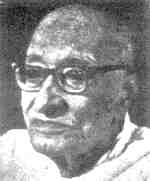|
 Page1
Page1
It is commonly thought that the main teaching of Vedanta is retirement from the activities of the world. The English literary tradition according to which the ‘mild Hindu’ lets "the legions thunder past, then plunges in thought again" is mainly due to illusion, and partly also to wishful thinking. Far from this being true, it is a position refuted in almost every chapter of the Bhagavad Gita with great force. Sanyasa or
renunciation has over and over again been explained as the giving up of the selfish desire for the fruits of action, and not the giving up of action itself. -Gita XVIII (xi)
"He who renounces the reward resulting from action is called a renouncer."
Flight from painful duty is unmanly and ignoble. The teaching of Sri Krishna in the Gita,
which is the epitome of upanishadic scripture, is:
It is thine to do thy duty; the result does not be long to thee. It becometh not
thee to tremble when faced with the duties of thy life. Look upon pleasure and pain and
loss and gain as the same and fight-thereby thou incurrest no sin.
Author : Shri C. Raja Gopalachari
|